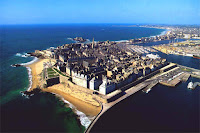I, just this morning, finished reading this beautiful, amazing, frustrating, hard to read best seller.
Besides being on the New York Times Bestseller list for weeks and weeks, the Times also listed "All the Light We Cannot See" by Anthony Doerr, as one of the 10 best books of 2014. It was a National Book Award Finalist...and the list goes on.
I'm amazed that it was, and still is, a best seller because it's not easy. At 530 pages, it's daunting from the get-go. From the beginning where we meet the main characters - nothing much happens the way you think it will - or hope it will.
The story follows the lives of two characters. Marie-Laure lives with her father in Paris. Marie-Laure is blind. Her father adores her.
Werner is an orphan in a mining town in Germany. He is gifted with the ability to fix radios.
Naturally, in this epic, there are loads of other complicated characters playing against the backdrop of World War II.
What did I like about "All the Light We Cannot See?"
The Magic of Radio - I grew up listening to the radio. I still do. It's an intimate means of communication. I can relate to how important radio was to both Marie-Laure and Werner.
Cultural Treasures - This book reminds us, once again, of how conquerors like to plunder and steal treasures and what those who love them will sacrifice to save them.
Kindness and Strength - We see both coming from people whom society doesn't see as having these traits. For instance we see kindness coming from some German soldiers during the war and strength coming from old women and men - and a blind girl.
Much of the story takes place in the beautiful, walled city of Saint-Malo, off the coast of France. We, the Americans, bombed it almost to oblivion in 1944.
I chose to read this novel slowly and to read each chapter as its owe entity, and to savor the beauty of the writing. Otherwise, I would have been seriously frustrated. For instance, I was engrossed in something happening in 1945 and, at the end of the chapter, anxious to learn how the situation resolved. I turned the page to see the heading "1974." What?
***
Besides being on the New York Times Bestseller list for weeks and weeks, the Times also listed "All the Light We Cannot See" by Anthony Doerr, as one of the 10 best books of 2014. It was a National Book Award Finalist...and the list goes on.
I'm amazed that it was, and still is, a best seller because it's not easy. At 530 pages, it's daunting from the get-go. From the beginning where we meet the main characters - nothing much happens the way you think it will - or hope it will.
The story follows the lives of two characters. Marie-Laure lives with her father in Paris. Marie-Laure is blind. Her father adores her.
Werner is an orphan in a mining town in Germany. He is gifted with the ability to fix radios.
Naturally, in this epic, there are loads of other complicated characters playing against the backdrop of World War II.
What did I like about "All the Light We Cannot See?"
The Magic of Radio - I grew up listening to the radio. I still do. It's an intimate means of communication. I can relate to how important radio was to both Marie-Laure and Werner.
 |
| Saint Malo |
Kindness and Strength - We see both coming from people whom society doesn't see as having these traits. For instance we see kindness coming from some German soldiers during the war and strength coming from old women and men - and a blind girl.
Much of the story takes place in the beautiful, walled city of Saint-Malo, off the coast of France. We, the Americans, bombed it almost to oblivion in 1944.
I chose to read this novel slowly and to read each chapter as its owe entity, and to savor the beauty of the writing. Otherwise, I would have been seriously frustrated. For instance, I was engrossed in something happening in 1945 and, at the end of the chapter, anxious to learn how the situation resolved. I turned the page to see the heading "1974." What?
***

